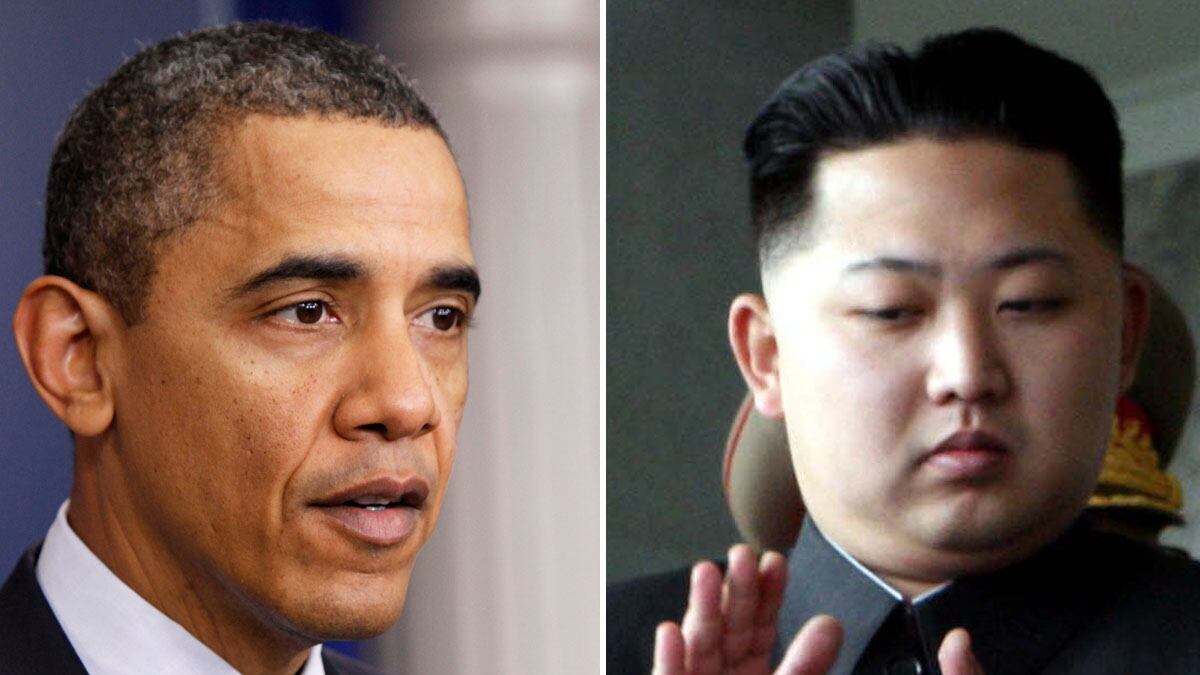Here’s what the U.S. government knows or thinks it knows about the highly secretive change of North Korea’s dictators. Actually, it knows a lot and a little. U.S. officials always worry about Pyongyang, but today’s news did not spark war jitters. Here’s what it means for U.S. policy. Actually, it's not much different than under the previous dictator, but there are some interesting twists and turns—especially the relatively modest nuclear demands now being made on Pyongyang compared to the tough demands on Tehran. Of course, President Obama will wait as things sort themselves out in Pyongyang.
American intelligence had clear signs at least three years ago, in 2008, that Kim Jong-il was dying and that he was starting to prepare the ground for his No. 3 son, Kim Jong-un, to succeed him. Rumor had it that the first two sons were fit only to be Republican candidates for U.S. president, and that the third at least had some promise to continue the Kim lineage. Kim Jong-il moved quickly to place people he regarded as potential strong allies of Jong-un in key Communist Party and North Korean military positions.
In 2010, the Dear Leader, as Father Kim was known, made Jong-un, supposedly somewhere around 28 years old, a four-star general. It’s good to be the king, and North Korean generals apparently did not complain. Kim Jong-il went further and named his sister (Jong-un’s aunt) and her husband (Jong-un’s uncle) to key party leadership posts. U.S. intelligence had good reason to believe that the aunt and uncle were put in these positions precisely to help Jong-un through his initial trials—and not to become a source of opposition to him. The evidence? The relatives replaced older members of these power groups, who might have opposed the son. “The assumption by all,” said Evans Revere in an interview, “was that Jong-un needed time to build gravitas, credibility, and strength.” Revere, now a senior director of the Albright Stonebridge Group and formerly a senior State Department official who dealt with the Koreas, further noted that Jong-un had already joined the leadership group—visually—when he appeared with the top bosses on the reviewing stand for the annual big military parade in 2010.
It’s hard to find anyone who’s laid eyes on this new ruler-to-be. Chinese officials met him, apparently when he accompanied his father on a trip to Beijing. Predictably, they spoke of him as “quick and sharp.” The compliments flow from Chinese policy, which is to keep the transition calm and peaceful, all with the aim of preventing the collapse of the impoverished North Korean regime.
The U.S. policy situation is obvious, scary, and interesting. U.S. negotiators have been in private contact with their North Korean counterparts for about six months, after a long interregnum, and the two sides were on the verge of an intriguing deal: The U.S. would provide North Korea with substantial humanitarian food relief. In turn, North Korea would freeze its uranium-enrichment program and allow for international monitoring.

The striking feature of this almost-deal is how modest Washington’s demands were relative to its tough position on nukes with Iran. The Obama team and Pyongyang’s neighbors just want to get things started with Pyongyang. Thus, they’d be satisfied with a freeze on nuclear activities. From Iran, by contrast, Washington demands a commitment not to go nuclear plus strong inspections. Vice President Joe Biden explained the difference this way when I interviewed him for Newsweek last week. He said the situation in the Middle East was urgent and dangerous, because Iran’s going nuclear would lead its neighbors to acquire nukes as well. Apparently, North Korea’s neighbors are more willing for the moment both to live with North Korea’s nukes and to rely on the U.S. nuclear umbrella to deter attacks and protect them.
In any event, the Obama administration expects that the deal with Pyongyang won’t be concluded in the coming months and perhaps within the coming year. U.S. officials assume that Jong-un will need far more clout than he now has to overcome presumed military resistance to the deal. In this approach, the administration is supported by the South Korean government, which has changed its hard-line position in recent months in favor of these negotiations. The bottom line is that America and its partners want to be calm, welcoming, firm, and unthreatening to North Korean leaders at this time. They’re eager to pick up the negotiating pieces as soon as possible.
With Iran, then, there is increasing talk of war. With North Korea, the palaver is mostly about hoping and waiting.





